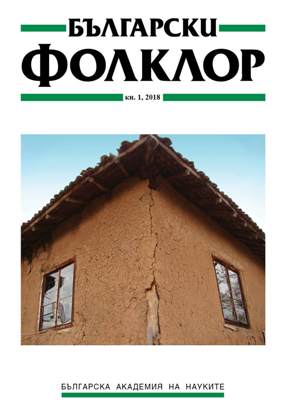Концептът дом в украинския прозаичен фолклор от първата половина на ХХ век: семантика на „загубата“
The Concept of Home in Ukrainian Prosaic Folklore from the First Half of the 20th Century: The Semantics of “the Lost Home”
Author(s): Oksana KuzmenkoSubject(s): Politics / Political Sciences, History, Anthropology, Social Sciences, Cultural history, Customs / Folklore, Ethnohistory, Military history, Oral history, Political history, Cultural Anthropology / Ethnology, Culture and social structure , Pre-WW I & WW I (1900 -1919), Interwar Period (1920 - 1939)
Published by: Институт за етнология и фолклористика с Етнографски музей при БАН
Keywords: folklore narrative; poetics; spatial images; home concept; mythological oppositions
Summary/Abstract: The author analyses symbolic spatial images typical for the Ukrainian folklore narratives about World War I (1914−1918), famine (1932−1933), forced deportations (1946–1947). Thus she investigates the images of landscape (forest, mountain). Special attention is paid to the objects of the closed inner space which forms the concept of home with the help of its congenial attributive characteristics (burnt empty house, evacuated burnt village, destroyed church, dug out grave). The indicated loci, on the background of the universal mythological oppositions “own” – “alien”, “here” – “there”, “old” – “new”, build up a generalized image of the character’s destroyed vital microcosm and places of his/her annihilated freedoms.
Journal: Български фолклор
- Issue Year: XLIV/2018
- Issue No: 1
- Page Range: 003-016
- Page Count: 14
- Language: Bulgarian
- Content File-PDF

